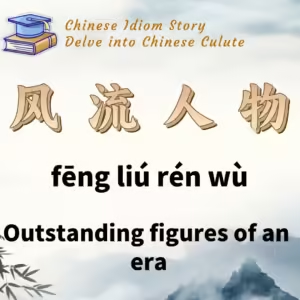
Chinese Idiom: 人杰地灵 (Ren Jie Di Ling)
English Translation: Extraordinary People Make Extraordinary Places
pīn yīn: rén jié dì líng
Idiom Meaning: Refers to the idea that a place becomes famous or notable due to the presence or achievements of outstanding individuals.
Historical Source: The Preface to the Pavilion of Teng (滕王阁序) by Wang Bo, early Tang Dynasty.
Idiom Story: The idiom “人杰地灵” (Rén jié dì líng) originates from Wang Bo’s famous prose The Preface to the Pavilion of Teng (滕王阁序), written in 675 AD during the Tang Dynasty. The Pavilion of Teng, or Tengwang Pavilion, was originally built by Li Yuan, the son of Tang Gaozu, when he governed Hongzhou (now Nanchang, Jiangxi Province). It was later renovated by another governor, Yan, during the Tang Dynasty.
During the Mid-Autumn Festival, Wang Bo, a prominent early Tang Dynasty writer, attended a banquet hosted by Governor Yan at the Pavilion of Teng. At the gathering, Wang Bo was the youngest guest and was seated at the end of the table. Governor Yan requested that the attendees compose an inscription to be carved onto a stone tablet. Although initially disregarded, Wang Bo, despite his youth and low status, took on the task and composed a remarkable preface.
The preface begins with vivid descriptions of the scenery and atmosphere around the pavilion, but it is the line “物华天宝,龙光射牛斗之墟;人杰地灵,徐孺下陈蕃之榻” that stands out. The phrase translates to: “The beauty of the material world rivals the celestial treasures, and the light of the dragon sword shines between the stars; outstanding people and spiritual land, as in the hospitality of Xu Ru and Chen Fan.”
In this line, Wang Bo uses two historical references to express that Hongzhou is blessed with both natural beauty and exceptional people. He implies that the region’s charm and significance are enhanced by the extraordinary individuals who have graced it.
Governor Yan was deeply impressed by Wang Bo’s eloquence and insight, leading him to praise the preface enthusiastically. The term “人杰地灵” thus evolved to signify the notion that great places owe their prestige and splendor to the remarkable individuals associated with them.






